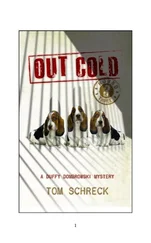As the makeshift cortege climbed onto the higher ground, the weather got worse. It became squally with showers of rain and sleet, and by the time they reached the ford on the Nordur River the water was rising and the ford was deep. They waded across cautiously and late in the afternoon reached a small farm at a place called Nether Ness. At this point the man in charge, a steady farm worker called Hrolf, decided that it would be wise to call a halt for the day. Ahead lay the ford across the Hvit River, and Hrolf did not fancy trying to cross it in the dark, especially if the water was running high. He asked the farmer if they could stay the night. The farmer said they could bed down in the main hall, but it was late and as he had had no warning of their arrival, he would not be able to feed them. It was a churlish reply, but the Frodriver men were glad to get some sort of shelter even if they went to sleep hungry. So they unloaded my mother's coffin, stored it in an outhouse, fed and watered their horses and put them in a paddock near the farm, and brought their saddle bags into the hall.
The household settled down for the night, and the travellers were making themselves reasonably comfortable among the straw bales, which served as seats running the length of the main hall, when an odd sound was heard. It came from the larder. Going to investigate, one of the farm servants found my mother, stark naked, standing in the larder, preparing a meal. The unfortunate servant was too shocked even to scream. She rushed to the bed closet, where the farmer and his wife were just dropping off to sleep, and blurted out that she had seen a burly nude woman, her skin a deathly white, standing in the larder and reaching to take bread from the shelves, with a full pitcher of milk already beside her on the work table. The farmer's wife went to see, and there indeed was Thorgunna, calmly slicing thin strips off a leg of dried lamb, and arranging the slices on a wooden board. The farmer's wife did not know what to do. She had never met my mother, so did not recognise her, and she was utterly at a loss at this strange apparition. At this stage the corpse-bearers from Frodriver, awakened by the commotion, appeared. They, of course, recognised Thorgunna at once, or so they later claimed. Hrolf whispered to the farmer's wife that the apparition was Thorgunna's fetch or spirit, and it would be dangerous to interfere. He suggested that the farmer's wife should clear off the main dining table so that Thorgunna could set the table. Then the farmer himself invited the men to sit and take their missing evening meal. As soon as they had sat themselves at the farm table, Thorgunna in her usual taciturn way served them, placing down the food without a word and walking ponderously out of the room. She then vanished.
The Frodriver men remained at the table, taking care to make the sign of the cross over the food, and ate their delayed supper while the farmer hurriedly found some holy water and began sprinkling it in every corner of the building. Nothing was too much trouble for the farmer's wife now. She gave the travellers dry clothes and hung up their wet ones to dry, brought out blankets and pillows so they could sleep more comfortably and generally made as much fuss of them as possible.
Was the apparition of Thorgunna an elaborate hoax? Did the supperless Frodriver men arrange for someone to play the part of Thorgunna? It was dark and gloomy in the farm building, and the candles were not lit until after Thorgunna had served the meal and withdrawn, so a substitution and a bit of play-acting might just have succeeded. The nudity was a nice touch as most people are too shy to look closely at someone stark naked. On the other hand, who did the Frodriver men persuade to act the role of Thorgunna? A local farm woman would have been recognised at once, and the band of corpse-bearers were all male. Yet it is suspicious that her apparition was such a bonus for the corpse-bearers on the rest of their journey to Skalholt, where they delivered the coffin to the Christian priest at the brand-new church there, and handed over the money from Thorgunna's bequest. They lost no opportunity to recount the strange events of their evening at Nether Ness, and every farm they passed invited them in for a meal, for beer, for shelter if they needed it.
Do I believe that my mother's fetch appeared at Nether Ness? If I told that same story here in the scriptorium and changed the details, saying that she had reappeared emitting a strange glow and holding a copy of the Bible, my colleagues would accept my version of events without hesitation. So why would not the farmers of Snaefells be just as convinced that she had reappeared? Farmers can be as credulous as priests. There is hardly a soul in that remote farming community who doubts that Thorgunna came back to haunt the stingy farmer at Nether Ness, and while there might be an earthly explanation for the happenings at Nether Ness, until this explanation is supplied I am prepared to accept the supernatural. During my lifetime of travels I was to see many odd sights that defy conventional explanation. Within a few years of my mother's death I too encountered a fetch, and on the eve of a great battle I had strange and vivid forebodings which proved to be accurate. Often I've witnessed events which somehow I know that I have seen before, and sometimes my dreams at night recall events that are in the past, but sometimes they also bring me into the future. The facility for seidr is improved by apprenticeship to a practitioner, but there must be a natural talent in the first place, which is nearly always a question of descent. Volva and seidrmanna come from the same families down through the generations, and this is why I have spent so much time writing of the strange circumstances
of Thorgunna's departure from this life and the hauntings: my mother gave me neither affection nor care, but she did bequeath to me a strange and disturbing gift - a power of second sight, which occasionally overwhelms me and over which I have no control.

ON HER DEATH bed Thorgunna made no mention of her son because she already had sent me off to join my real father. I was just two years old. I bear my mother no grudge on this score. Handing on a two-year-old child like a parcel may seem harsh, but there was nothing unusual about this. Among the Norsemen it is common practice for young children to be fostered out by their natural parents, who send them off to neighbouring families to be raised and educated. It binds the two families together, and this can be very useful when it comes to conducting local politics and intrigues among the Icelanders. Almost every family has its foster sons and daughters, foster brothers and sisters, and the attachments built up between them can be just as strong as between natural siblings. Besides, everyone at Frodriver had heard the rumour that my father was Leif Eriksson. So I was not being fostered, but merely sent to him where he lived with his father Erik the Red in Greenland. Indeed it turned out to be the kindest thing that my mother ever did for me because this second sea journey of my infancy placed me in the care of the woman who became more a mother to me than my own. Gudrid Thorbjornsdottir was everything that her reputation claims — she was kind, thoughtful, clever, hard-working, beautiful and generous of spirit.
Gudrid was travelling with her husband, the merchant Thorir, known as the Easterner, just at the time my mother at Frodriver was looking for someone to take her small child off to Greenland as she had long ago promised my father. And perhaps, too, my mother had a premonition of her own death. Thorir was pioneering a regular trading run between Iceland and Greenland, so when his ship called in at Snaefellsness Thorgunna put her request to Gudrid, and it was Gudrid who agreed to take me to my father.
Читать дальше









